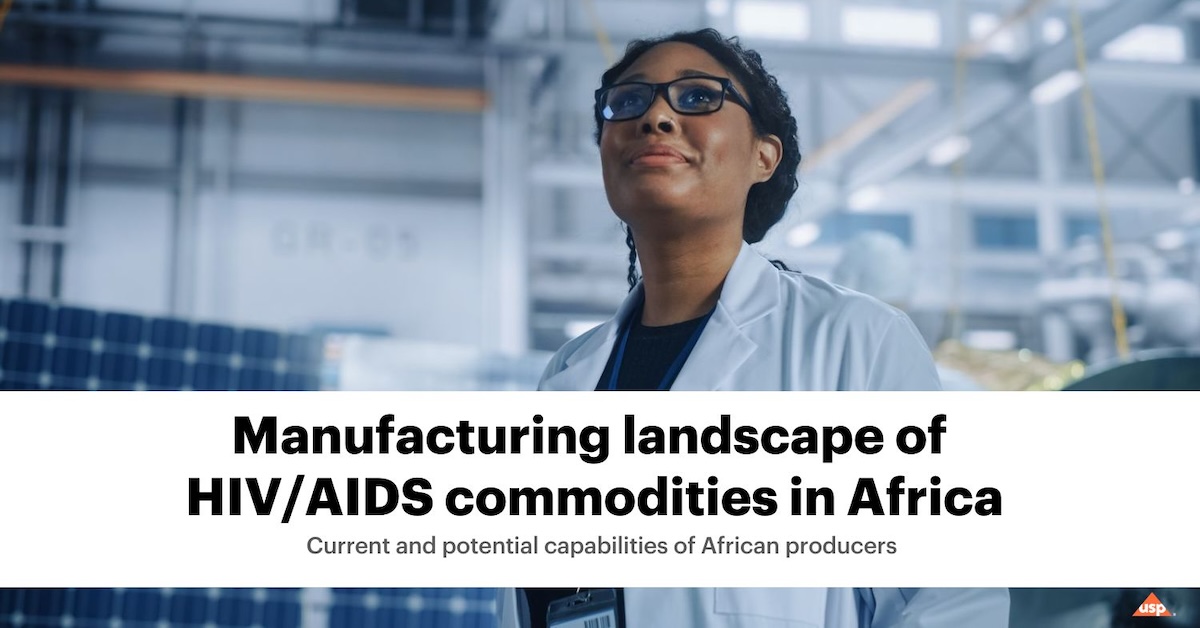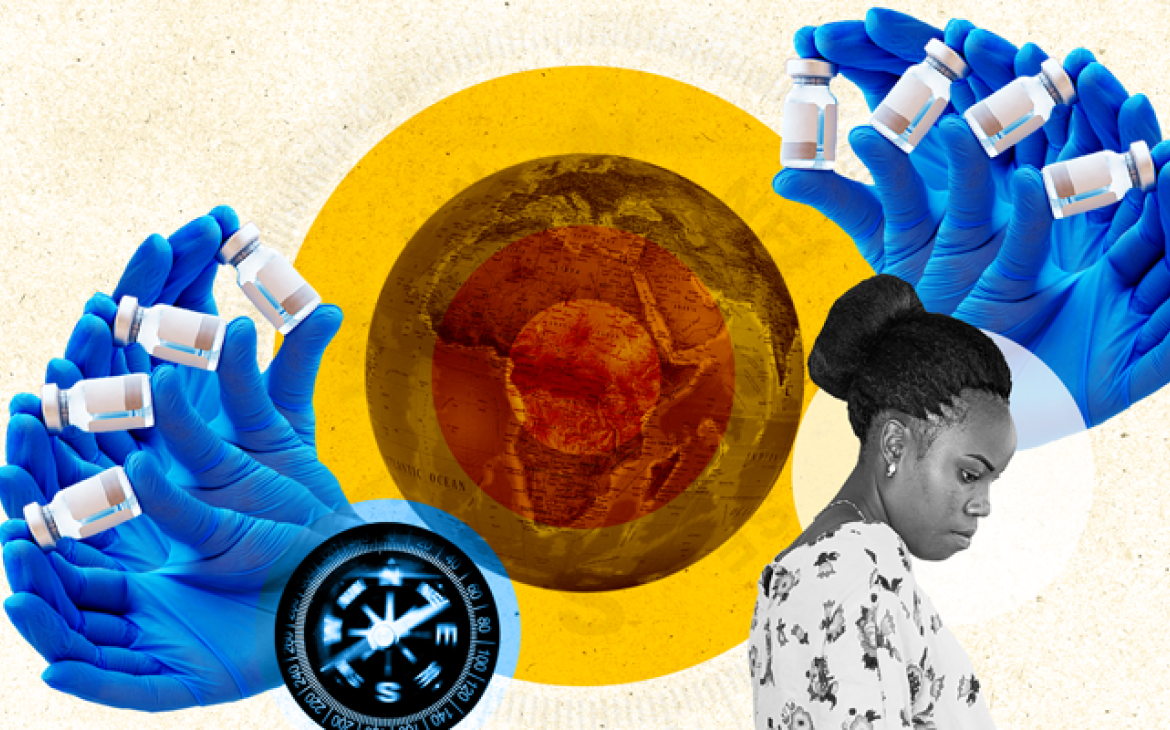
Expanding regional manufacturing to increase supply and improve health security across Africa
As the U.S. President’s Emergency Plan for AIDS Relief (PEPFAR) expands procurement of HIV/AIDS commodities to include more products made in Africa as part of its five-year strategy to combat HIV/AIDS, regional manufacturing will be central to its efforts.
To that end, in advance of the U.S.-Africa Business Summit, which brings renewed focus on sustainable partnerships, including those with U.S. government agencies like PEPFAR, we look forward to working with African countries to increase regional production of medical products across the continent, including HIV/AIDS commodities, and promoting sustainable growth in Africa’s pharmaceutical sector.
“If the continent can produce ARVs, it will be part of sustaining our response so that everyone living with HIV/AIDs has access to lifesaving drugs." – Ambassador Dr. John Nkengasong, U.S. Global AIDS Coordinator and Special Representative for Global Health Diplomacy (OGAC)
Explore the interactive report:

Leveraging partnerships
Recent data on African-based production of medical products, including a manufacturing landscape assessment on maternal health supplies in Africa, highlight an over-reliance on pharmaceutical imports across the continent. Given this dependence on foreign manufacturers, the African Union made regional production a central pillar of its New Public Health Order, and partnerships that support African-produced medicines, vaccines, and other medical products, are central to their efforts.
Leveraging pre-existing systems and structures, as well as traditional and innovative partnerships developed during the HIV/AIDS response is one way to expand regional production. To that end, PEPFAR plans to support the scale-up of regional manufacturing by procuring HIV/AIDS health products from African producers, helping to shape markets and bring investors to the table.
Expanding PEPFAR’s procurement goals
There are currently about 600 manufacturers producing packaged medicines in Africa, with 80 percent of those producers concentrated in just eight countries. But that number will soon change as the number of manufacturers on the continent grows, in part due to PEPFAR and other donors.
While PEFPAR spends approximately US$750 million each year on HIV/AIDS health products, like diagnostic tests and treatment, to date, it has procured less than 1 percent of the value of these commodities from African producers.
But PEPFAR is looking to change how it does business. By 2025, PEPFAR aims to procure 15 million HIV tests from African manufacturers. Similarly, by 2030, it plans to put at least two million patients on first-line antiretroviral (ARV) treatments produced on the continent.
Expanding manufacturing capacity
Producing medicines closer to patients builds supply chain resilience and improves health equity.
Read more
Increasing manufacturing capacity in Africa
While the pharmaceutical landscape varies significantly by region and product, when it comes to HIV/AIDS diagnostics and therapeutics, the picture is starting to change across African countries. In some countries, manufacturers can meet 30-70 percent of local demand for all medical products, including those used to diagnose and treat HIV/AIDS.
For example, in Ghana, policies put in place to locally produce therapeutics are helping boost capacity to meet national need. However, this is still largely an exception across the continent and most countries do not have the manufacturing capability to meet regional or national demands to realize PEPFAR’s goals.
Manufacturing maternal health supplies in Africa
In Africa, limited regional manufacturing, disruptions in health supply chains, and an over-reliance on imports decrease women's access to essential maternal health products.
Read the report
Promoting an enabling environment
Efforts to grow pharmaceutical manufacturing and strengthen regulatory systems will only be as successful as the partnerships and investments that support it. Developing a broader enabling ecosystem is needed to ensure sustainability in regional production.
“For manufacturing in Africa to flourish, an ecosystem approach is imperative. " - Dr. Perrer Tosso, Director, Pharmaceutical Manufacturing & Supply Programs, USP
This means greater investments in the biomanufacturing workforce, access to affordable financing for manufacturers, adequate infrastructure to produce and distribute goods, more robust collaborations to help leapfrog the industry forward, stronger regulatory systems, additional market shaping efforts, and advantageous and incentivizing policies.
More production, stronger regulation
Ensuring Africa’s pharmaceutical sector is sustainable is critical to its long-term success. One way to improve sustainability is by bolstering national, regional, and continental regulatory systems. Strong regulatory functions must keep pace with expanded manufacturing, so that African-produced health products are reviewed and approved by appropriate regulatory authorities.
Yet only a few regulators in Africa have achieved WHO Maturity Level 3 (ML3), the mark of a stable, well-functioning regulatory system. Most countries across Africa are still at Maturity Level 1 (ML1) and in need of continued support. Reliance and recognition mechanisms exist, where ML1 countries may lean on ML3 countries to provide essential regulatory functions, however, they’re no substitute for stronger national regulatory systems.
Strengthening regulatory systems
Advancing regulatory maturity protects consumers from poor-quality medicines and improves public health.
Read more
Regional regulatory bodies, like the African Medicines Agency (AMA), have tremendous potential to help expand manufacturing efforts, combat substandard and falsified medical products, and streamline approvals of medical products across Africa. However, it’s important to remember that the AMA should complement, not replace, national regulatory systems. In fact, strengthening national regulatory systems, while simultaneously supporting the AMA, is central to improving sustainability. But for the AMA to succeed, the AU needs financial, technical, and human resources to ensure that the AMA is high functioning.
DFIs and private investment
A lack of access to reasonable financing instruments is a large impediment to expanding pharmaceutical manufacturing in Africa. National and international development finance institutions (DFIs) that support private sector investment in low- and middle-income countries have a major role to play.
DFIs like the U.S. International Development Finance Corporation (DFC) seek to finance eligible private sector projects that build regional manufacturing capacity for therapeutics, diagnostics, and ancillary supplies in developing countries, with a focus on Africa.
These types of DFI initiatives are encouraging, as are those from the African Development Bank in forming the African Pharmaceutical Technology Foundation to support access to technology and efforts by the Medicines Patent Pool working with innovators to share relevant technology and licensing of COVID-19 treatments.
Procurement incentives
In addition, announcements on off-take guarantees, procurement set-asides, assisted access to technologies and innovations and other market shaping tools that support regional production will continue to support manufacturers’ ability to make additional investments. Creating conditions where manufacturers have more market assurance helps spur their own investments.
To that end, pooled procurement is another opportunity to increase investment, ensure demand, and improve access to medicines for patients at a more competitive cost. Building on work of the United Nations Economic Commission for Africa (UNECA), Africa CDC, the Intergovernmental Authority on Development (IGAD) in Eastern Africa, and other regional bodies to advance pooled procurement helps ensure that there is a sustained local and regional demand for African-made health products.
Moving forward
PEPFAR and other international donors and procurement bodies can help support regional manufacturing in Africa to improve access to quality-assured medicines for patients. This includes making technology more accessible to regional manufacturers, supporting greater capacity building and sustainable manufacturing practices, strengthening regulatory pathways for regional procurement, and ensuring manufacturers have access to financing.
Expanding regional production of HIV/AIDS commodities and other health products will not only save lives and improve health equity and security, it will also position the continent to better respond to future health emergencies.


